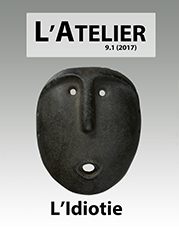« She made mouths at me instead of speaking » : Marie Broc, l’idiote de Villette (Charlotte Brontë, 1853)
Keywords:
Brontë, Charlotte, idiotie, Kristeva, Julia, AbjectAbstract
Villette (Charlotte Brontë, 1853) offre à ses lecteurs la confrontation entre Lucy Snowe, la narratrice-protagoniste, et une enfant attardée appelée Marie Broc, située tout à la fois à la marge de l’univers dans lequel évolue Lucy (un pensionnat où précisément les jeunes filles apprennent à devenir des adultes accomplies) et à celle du roman, où elle ne fait qu’une brève apparition. Le caractère périphérique du personnage ne saurait masquer l’importance du tête-à-tête avec Marie Broc, dont Lucy a la charge tout au long d’une période de grande solitude qui s’achève par son effondrement physique et psychique. L’étude de la relation spéculaire que Lucy entretient avec cette figure permet tout d’abord de comprendre que l’héroïne est menacée par la stase, la présence de l’idiote minant le concept même de Bildung auquel la quête amoureuse et sociale de Lucy devrait pourtant rattacher la trame du roman.
Ce premier point conduit à envisager que l’idiote incarne également la menace d’un processus régressif. La relecture du tête-à-tête à la lumière des travaux de Julia Kristeva sur l’abjection permet d’avancer que Marie Broc signale la difficulté du sujet féminin à définir l’Autre (le maternel) dans une altérité stable, et incarne la menace (ou la tentation ?) d’une régression définitive qui annihilerait toute construction identitaire. L’hypothèse défendue ici est donc que Marie Broc montre à Lucy ce qu’il advient quand le sujet féminin échoue à poser la mère comme Autre. La dimension conjuratoire du personnage de l’idiote est évaluée à l’aune des autres modalités de confrontation à l’abject que propose le roman. Il s’agit en effet de mieux saisir le processus dans lequel s’inscrit l’épisode de cette confrontation entre l’héroïne et l’idiote, son double inversé.
Villette (Charlotte Brontë, 1853) examines the dialectics of the time that Lucy Snowe, the narrator-protagonist, and Marie Broc, a retarded child, spend together at the boarding school. Marie Broc is a peripheral figure because of her location on the margins in the diegesis (the boarding-school where young girls are groomed to become accomplished young ladies) but also in terms of the novel itself since she is only a transient character. Her transience is however belied by the key significance of the section in which she appears, which ends with Lucy’s physical and mental collapse.
Marie Broc is a specular image of Lucy and her apathy reflects the stasis that threatens Lucy’s progress and Bildung. When read in the light of Julia Kristeva’s discussion on abjection, Marie Broc’s inertness mirrors the terrible consequences of failing to categorize the mother as other and the attending impossibility of emerging as individualised. Marie Broc’s idiolect (“she made mouths at me instead of speaking”) engages with Kristeva’s “semiotic” and draws critical attention to the permanence of the mother-child dyad. The cathartic dimension of the character is assessed against Lucy’s other engagements with the abject, and this brief episode may be better understood within the context of the various threats of annihilation that Lucy must grapple with.
Published
Issue
Section
License
- Work submitted for publication must be original, previously unpublished, and not under consideration for publication elsewhere. If previously published figures, tables, or parts of text are to be included, the copyright-holder's permission must have been obtained prior to submission.
- Authors of accepted manuscripts will assign to L'Atelier the right to electronically distribute their article, or publish it in any form (Internet, CD ROM, printed copy) but authors will retain copyright and, after the article has appeared in L'Atelier, authors may republish their text (in print and/or electronic form) as long as they clearly acknowledge L'Atelier as the original publisher.


